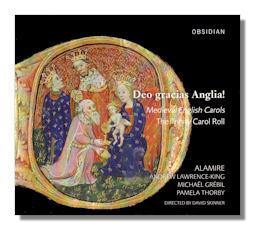
The Internet's Premier Classical Music Source
Related Links
- Latest Reviews
- More Reviews
-
By Composer
-
Collections
DVD & Blu-ray
Books
Concert Reviews
Articles/Interviews
Software
Audio
Search Amazon
Recommended Links
Site News
 CD Review
CD Review
Deo gracias Anglia!

Medieval English Carols from the Trinity Carol Roll
- Hail Marye ful of grace
- Nowel, nowel, nowel
- Alma redemptoris mater
- Now may we syngyn
- Be mery, be mery
- Nowel syng we
- Deo gracias Anglia
- Nowel, nowel
- Lullay, lullay
- Princeps pacis
- Nova, nova
- Tibi laus, tibi gloria
- Now make we merthe
- Abyde I hope it be the beste
- Qwat tydynges bryngyst thu messager
- Eya martir Stephane
- Prey for us the prynce of pees
- Ther is no rose of swych vertu
Andrew Lawrence-King, gothic harp & psaltery
Michaël Grébil, plectrum lute
Pmela Thorby, recorder & gemshorn
Alamire/David Skinner
Obsidian CD709
The standard of singing and playing on this CD is very high. It has twin merits: on the one hand the qualities of grace, of warmth, projection, of an uplifting and precise articulation and truly thoughtful delivery – as befits the depth of the songs. On the other, the distinction of spontaneity, a hint of roughness and genuineness, immediacy and punch – which may be imagined to have been how the dozen and a half songs from the Trinity Carol Roll were first conceived, performed and came to be known. Their performance of Nova, nova [tr.11], for instance, starts and ends with the greatest attention to the text (as it should); it brings rhythm without jauntiness and gravitas without ponderousness. At times there's a hint of rubato; but always in support of the way the English carol (stanzas alternating with a burden) wove melodic lines yet grounded harmonies and melodic development in something familiar and recognizable at all turns.
The Trinity Carol Roll, from Trinity College, Cambridge (MS O.3.58), is the earliest source for the English polyphonic carol, from the fifteenth century. While some of the works on this excellent CD are to be found on numerous other CDs (the Agincourt Carol [Deo gracias Anglia], Hail Marye ful of grace, Ther is no rose, for instance), these sprightly yet considered and technically excellent accounts by Alamire (Grace Davidson, soprano; Clare Wilkinson, contralto; Nicholas Todd, tenor; Simon Wall, tenor) directed by David Skinner stand out for the way in which pace loses nothing to depth; and vice versa. In addition to the 13 carols from the Trinity Roll, five other well-known mediaeval carols are included in the hour of music on the CD.
Where the music calls for sensitivity and gentle pondering of the texts, the performers bring attention and intimacy without losing momentum. Where it calls for extroversion or celebration, they offer energy and life without ever abandoning its essence or looking at it from outside. This leaves one to draw the welcome conclusion that everyone involved in the CD's production was working with similar values and working for similar musical ends; that they had an equally clear and realistic understanding of how the music works; and yet were all determined to bring a fresh but not indulgent new lease to its performance. They succeeded in every respect: voices soar and intone with real sentiment, breaths can be heard; but nothing is fey, fulsome, forced or falsely furious.
The booklet is up to the now well-established Obsidian's usual standards. It contains a useful introductory essay setting the music in context – particularly the origins, provenance and history of the manuscript; notes on the performing edition used – one Skinner prepared afresh for this recording; suggestions for further reading; brief biographies of the performers; and the texts (in Middle English, and Latin). The recording was actually made in the Wren Library, Trinity College, within yards of the location of the Roll. It's not an over atmospheric acoustic… the solo recorder at the start of Lullay, lullay [tr.9], for example, is close with next to no reverberation. The balance between voices and instruments is perfect, slightly favoring the former. No dressing up or romanticization; the music sounds as contemporary singers and players might have valued it. That sums up this recording, which is one which those new to the carols could well have as their first choice; while those with other recordings of this music will want to investigate it – particularly at its bargain price. Recommended.
Copyright © 2012, Mark Sealey.





















